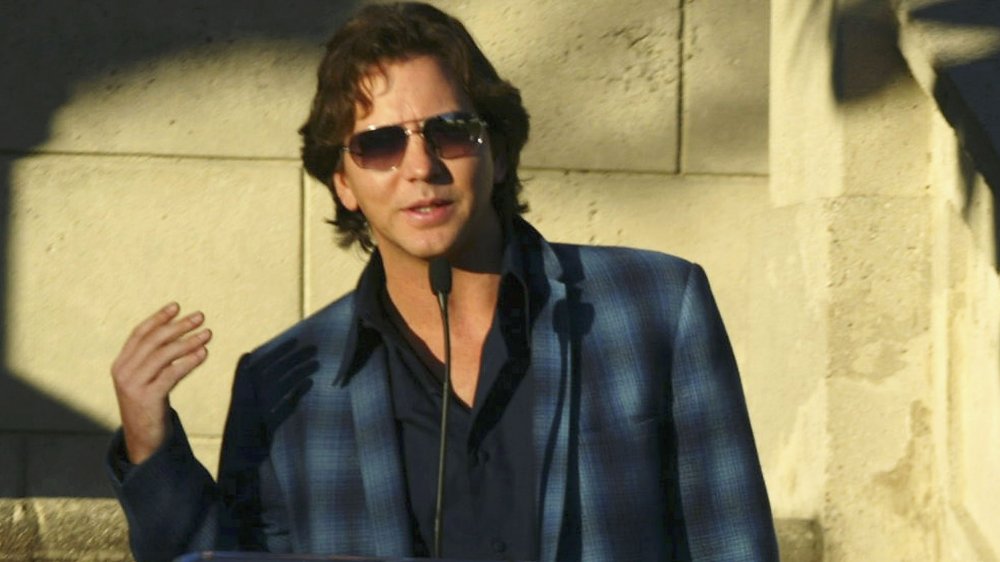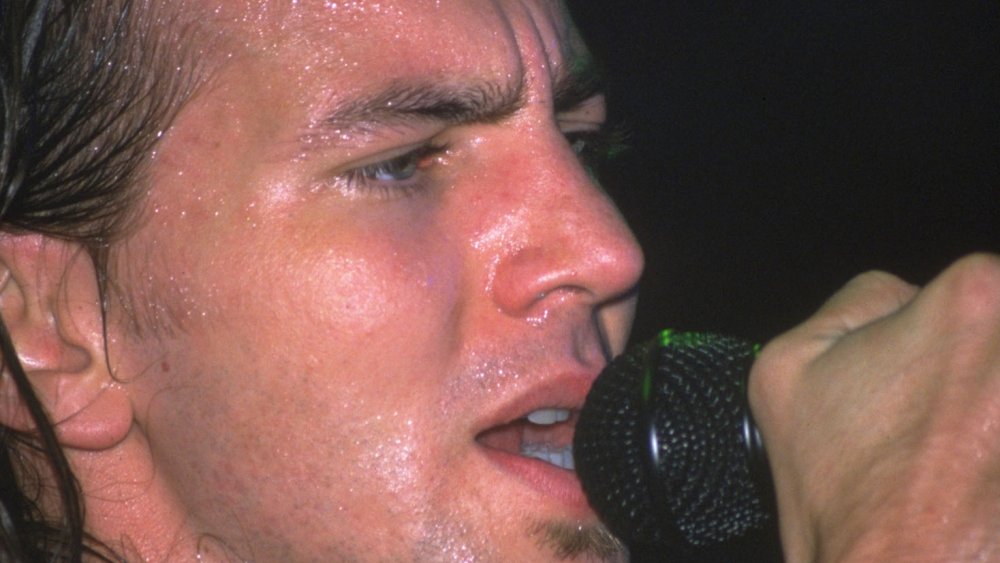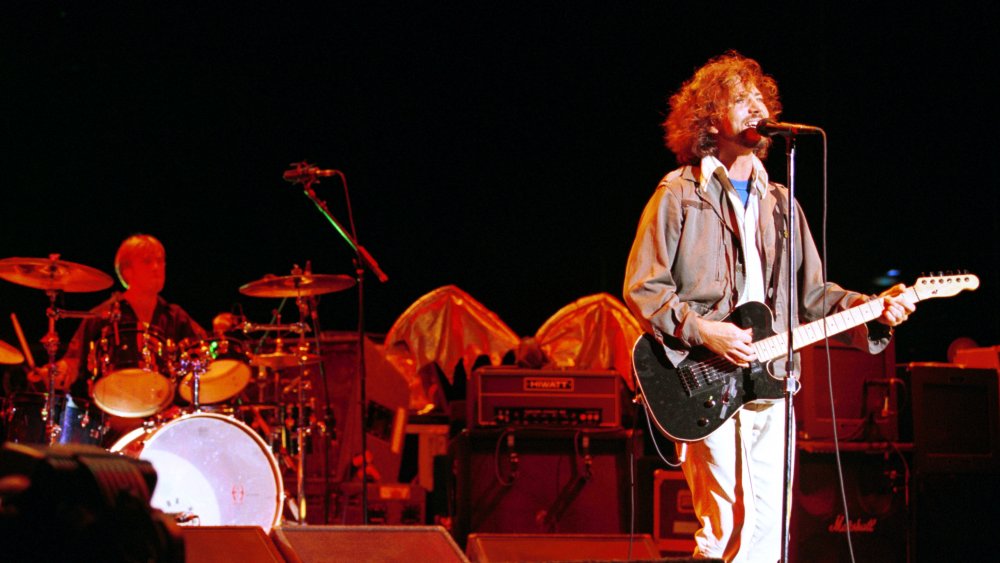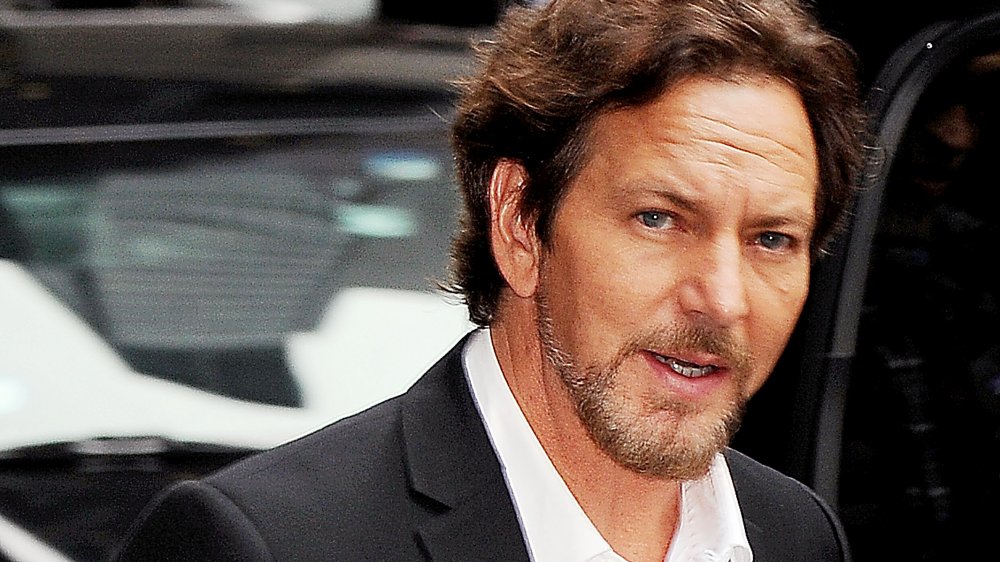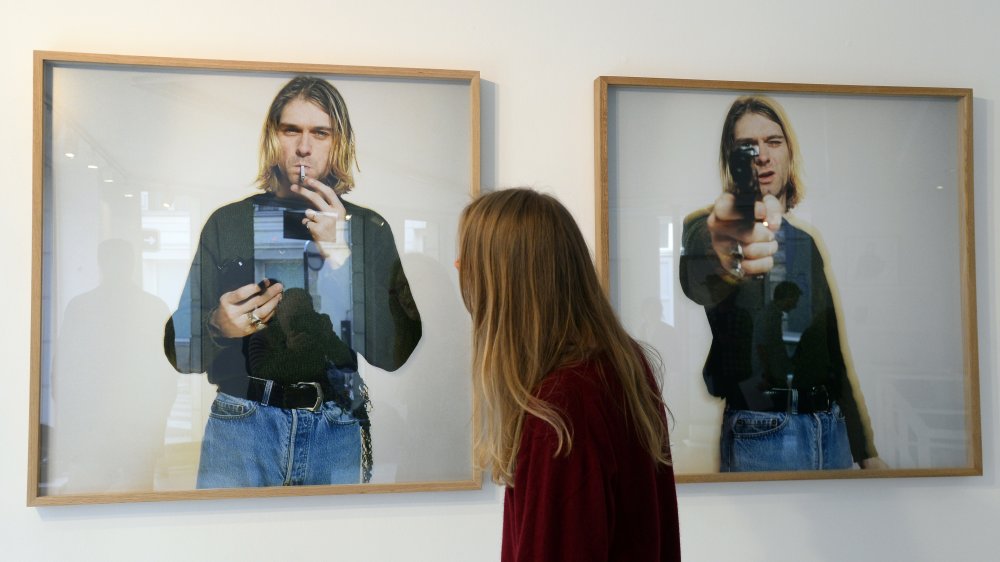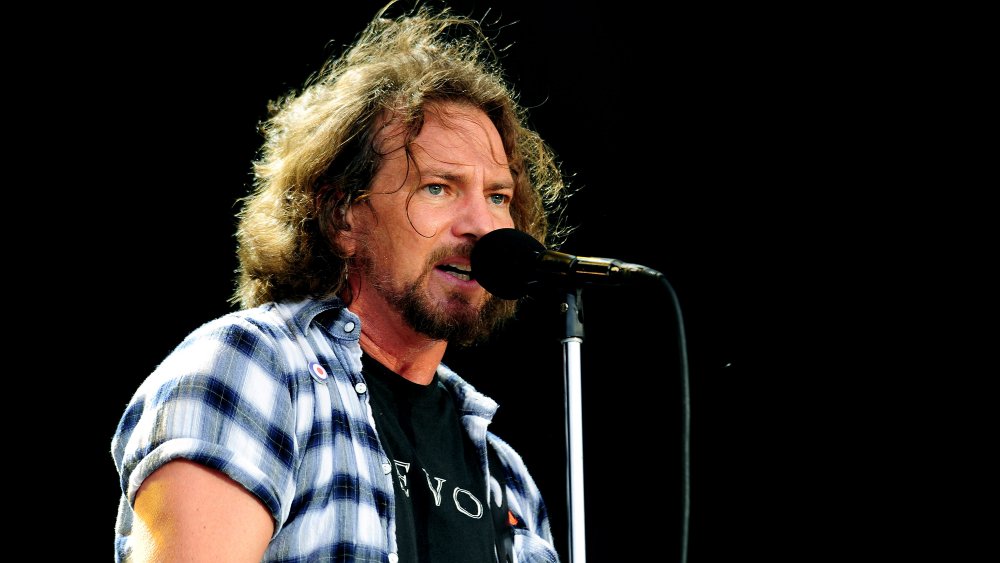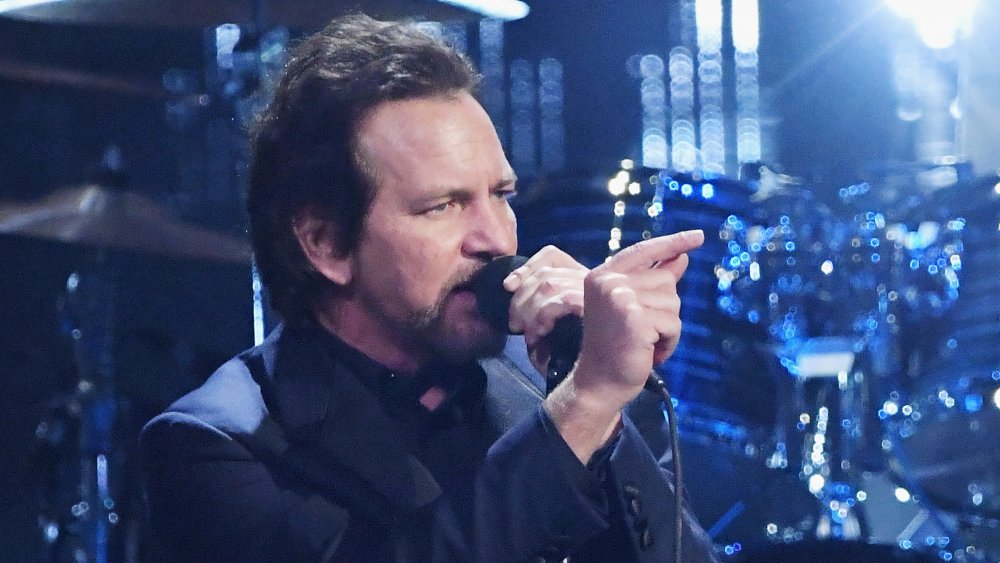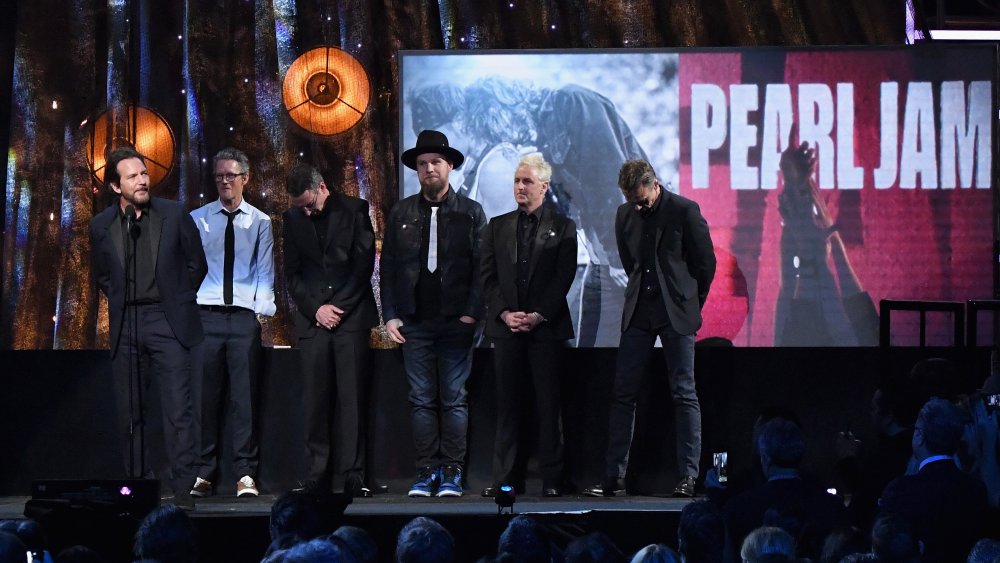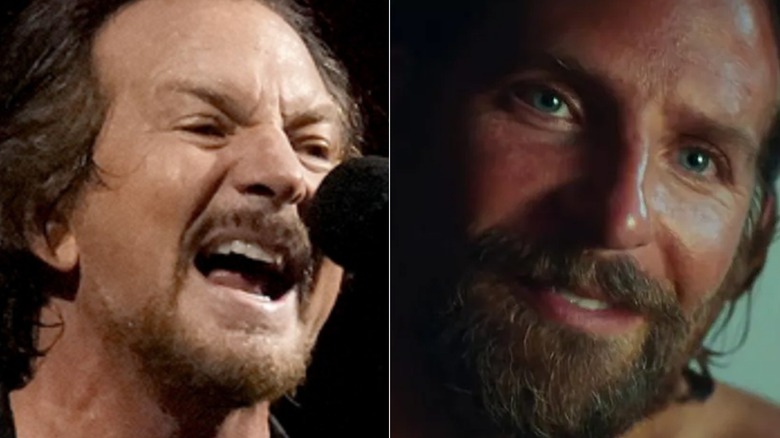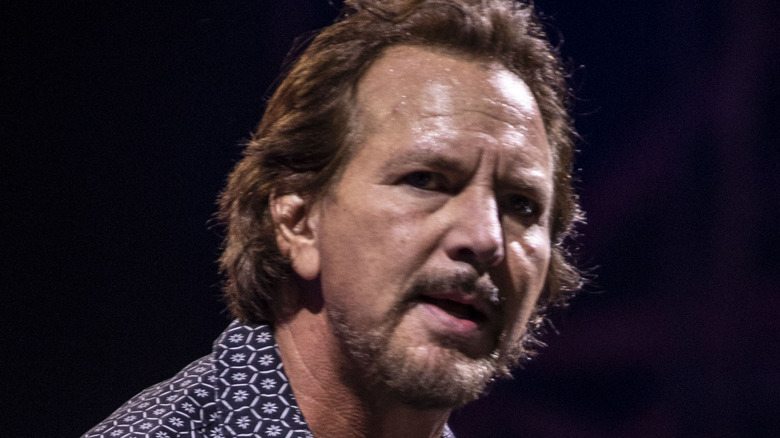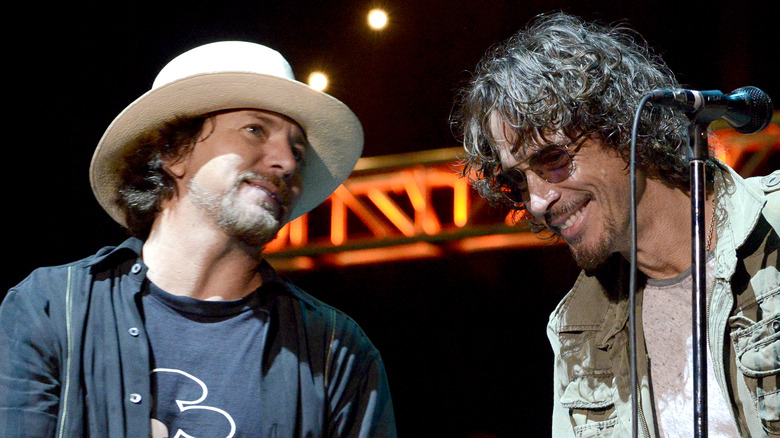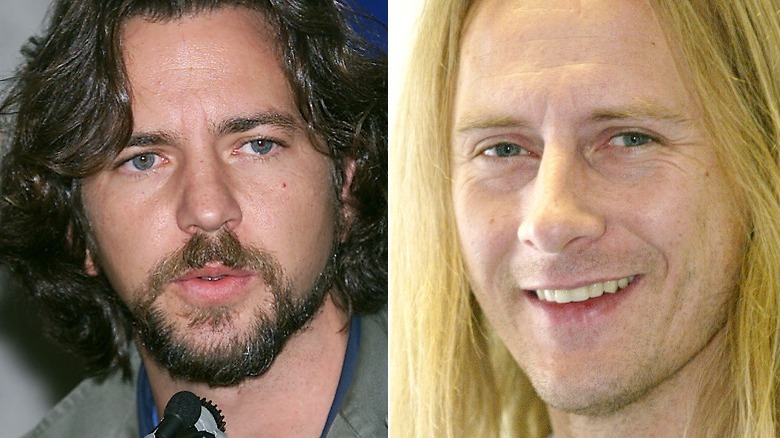16 Eddie Vedder Facts For Pearl Jam Fans
Ragged, real, and countercultural: That was grunge, and grunge was the nineties. From Kurt Cobain's furious passion to Chris Cornell's unforgettable, haunting lyrics, grunge was the musical genre that defined a generation. Sadly, many of the genre's biggest figures have now passed away, leaving heartbroken fans and tragic stories.
Eddie Vedder, on the other hand, is still going strong. As the frontman of Pearl Jam, Vedder has become the most prominent surviving icon of his era. And while Vedder — unlike so many of his contemporaries — never fell into the throes of excessive drug misuse and/or addiction, he has faced numerous challenges in his life. From his early family struggles, to dropping out of school, to the strange and personal hardships of rediscovering himself once Pearl Jam became one of the biggest bands in the world, Vedder has proven to be a dedicated performer, a never-ending advocate for social justice, a surfing enthusiast, and a figure who has solidified his role in music history, forever.
The following article mentions addiction, mental health issues, and suicide. If you or anyone you know needs help with addiction and/or mental health issues, help is available. Visit the Substance Abuse and Mental Health Services Administration website or contact SAMHSA's National Helpline at 1-800-662-HELP (4357). If you or anyone you know is having suicidal thoughts, please call the National Suicide Prevention Lifeline by dialing 988 or by calling 1-800-273-TALK (8255).
Eddie Vedder was born and raised with two different names
Born Edward Louis Severson III in 1964, as detailed by Biography, the boy that would one day be Eddie Vedder got off to a rough start. His parents divorced not long after he came into the world, and his mother remarried a man named Mueller. Thus, for much of the boy's younger years, he was led to believe that his stepfather was his real dad, and he went by the name Eddie Mueller. When he finally found out he'd been lied to, the truth hit him hard.
Vedder later told the Los Angeles Times that it "wasn't a happy childhood." The environment was tense, and by age 15, he'd already moved out into his own apartment. He worked at a drug store, struggled to keep up in school, and resented his peers for the privileges they took for granted, such as going to prom, or having parents who could give them a car as a gift. For the most part, he felt alone. As he puts it, "I'd fall asleep and things in class and they'd lecture me about the reality of their classroom. I said one day, 'You want to see my reality?' I opened up my backpack to where you usually keep your pencils. That's where I kept my bills . . . electric bills, rent . . . That was my reality."
Soon enough, it was too much to balance, and he dropped out of school.
Music was always Eddie Vedder's lifeline
Throughout family struggles, economic struggles, and dropping out of school, the one thing that consistently kept the young Eddie Vedder (at that time, Eddie Mueller) going was his passion for music. It was the Jackson Five who first got his attention, according to the Los Angeles Times, but his pivotal influence would prove to be The Who's "Who's Next" album, first introduced to him by a babysitter. By age 12, he talked his family into gifting him a guitar, and from there, music became his foremost hobby.
The year 1984 was when a then-20-year-old Eddie Vedder landed in California, guitar in hand, and decided to make a go at a musical career, according to Biography. He paid the bills by working as a hotel security guard, and furthered his talent by joining local bands. Getting past his naturally shyer tendencies was something of a struggle on stage, and he actually wore a mask to his early performances, which consisted of goggles that had been painted over to block out the audience. The more he did this, of course, the more confident he became.
Soon enough, he connected to some former members from the band Mother Love Bone, who were so impressed with his song "Alive" that they wanted him to form a band with them. Vedder followed them to Seattle, and within less than a year, the band — who would soon become known as Pearl Jam — hit number one.
Eddie Vedder's great-grandma Pearl made some great jam ... (or didn't)
Okay, so pretty much everyone knows what "Nirvana" means, or can figure it out easily enough. A band name like "Soundgarden" explains itself ... but what the hell is a "Pearl Jam" supposed to be, exactly?
Weird as that name might be, though, it could've been a whole lot weirder: As The New York Times points out, Pearl Jam originally called themselves Mookie Blaylock, after their favorite NBA player. A cool name for a person? Sure. But a terrible name for a band, unless, you know, all their songs were going to be about basketball. In any case, they soon rechristened themselves Pearl Jam, and by 1991, Vedder told Rolling Stone a rather fascinating origin story behind the name: Evidently, his great-grandmother had been named Pearl, and she used hallucinogenic ingredients like peyote to produce the world's trippiest preserve, or in other words, "Pearl's jam." Spread some of that on your toast, folks.
Cool tale? For sure. It's also a load of baloney. In 2006, Vedder admitted to Rolling Stone that while his grandmother was indeed named Pearl, the whole hallucinogenic jam thing was, in his words, "Total bull—-." The truth? Apparently, the "pearl" part of the name was something that Jeff Ament randomly came up with in a restaurant, and the "jam" part is a reference to musical jams, rather than the stuff you combine with peanut butter.
Eddie Vedder is a devoted activist
Throughout his career, Eddie Vedder has been an outspoken advocate for social justice, both on and off the stage. As described by The Sydney Morning Herald, he often railed against the George W. Bush administration, and he has listed causes like "people on death row, the treatment of animals, women's right to choose" as being close to his heart. As Global Citizen points out, Pearl Jam founded the Vitalogy Foundation in 2006, a nonprofit organization that supports community health, education, and more. Vedder also is co-founder of the EB Research Partnership, according to Biography, which helps fund treatments for childhood skin disorders. In fact, Pearl Jam has stated that they donate $2 from every ticket sold at every show to causes supported by their foundation. Even relatively small matters don't escape Vedder's attention, as demonstrated in 2016, when he donated $10,000 to a poor Maryland family facing eviction, via Rolling Stone.
Basically, Eddie Vedder is someone who always puts his money where his mouth is. If he believes in a cause, he dedicates himself to it. One of his biggest advocacy success stories was his support of the West Memphis Three. As a fierce critic of the U.S. prison system, Vedder discovered that these three boys had been imprisoned due to a poorly run investigation in 1993, and he performed benefit concerts for them. This raised awareness for their plight, and when new forensic evidence was brought to light in 2011, they were released.
Kurt Cobain's death hit Eddie Vedder hard
The conventional media narrative is that Nirvana and Pearl Jam were engaged in a harsh rivalry. The truth isn't quite so clean-cut.
As explained by The Washington Post, Cobain certainly did antagonize the other band, once remarking, "I find it offensive to be lumped in with bands like Pearl Jam." By 1992, though, as the Los Angeles Times points out, Cobain came to regret these insults, stating, "I'm not going to do that anymore ... it hurts Eddie and he's a good guy." This isn't surprising, really, since Cobain and Vedder came from similarly painful backgrounds, and both of them struggled with the burden of how fame transformed them from shy outsiders into massive public figures. In fact, Vedder later reminisced to Rolling Stone about a rather intimate moment between the two grunge icons at the 1994 MTV Music Awards, wherein the two of them slow-danced to Eric Clapton's "Tears in Heaven" beneath the stage.
The news of Kurt Cobain's death, then, was something which genuinely devastated Vedder. "When I first found out, I was in a hotel room in Washington, D.C., and I just tore the place to shreds," Vedder said, in 1994. "Then I just kind of sat in the rubble, which somehow felt right ... (it felt) like my world at the moment." As time has passed, Vedder has acknowledged that he still misses Cobain, and thinks of him often.
Eddie Vedder was so open with his fans that it led to stalker issues
One of the biggest ways that Eddie Vedder struggled with fame was the conflict between his desire to connect with his fans, and the need to maintain a safe distance. In the beginning of Pearl Jam's explosion into the mainstream, according to the Los Angeles Times, he devoted himself to his followers: Remembering his own loneliness as a youth, he would spend hours talking to fans after shows, talking to hundreds of people, or even giving out his own personal telephone number so they could talk to him if they needed help. When fans wrote him letters asking what his lyrics meant, he always wrote back. Vedder's dedication, here, was authentic, sincere, and kind, but it could lead to him being overwhelmed by his need to not let anyone down.
The problems escalated when one particular fan turned into a stalker: This woman, as The Sydney Morning Herald reported, came to the delusional belief that Vedder was the reincarnation of Jesus Christ, and that he'd also fathered her two sons. In response to these delusions, she drove her car through the wall of Vedder's house, almost killing herself. Because of this incident, Vedder's then-wife had new fences put up around their house, according to Rolling Stone, and ordered Pearl Jam's record company to help pay for round-the-clock security.
Eddie Vedder's family life
One of the biggest relationships of Eddie Vedder's life was with Beth Liebling, a writer and musician who was dating him when he first returned to San Diego in 1994, according to the Los Angeles Times. The two artists first came together as teenagers, and they stayed together as Vedder went on to become the frontman of Pearl Jam, and Liebling co-founded the experimental band Hovercraft. Sadly, in 2000, this relationship ended in divorce, according to Rolling Stone. Though Vedder didn't want to get into the details, he admitted that the split left him in a bad place, emotionally.
Liebling disappeared from the public eye for a while, but in 2019, she announced a comeback, according to Alternative Nation, with a new band named Teleportal. As for Vedder, he was lucky enough to discover new — and lasting — love right around the corner. He eventually met a model named Jill McCormick, pictured above, whom he was been with ever since. Vedder and McCormick had two children together, according to Billboard, and they finally solidified their union with a small Hawaiian wedding in 2010, which had Sean Penn and Jack Johnson in attendance.
When someone saved Eddie Vedder's life, he returned the favor
Eddie Vedder's reputation as a nice guy is fairly widespread, even among those who aren't fans of Pearl Jam. And surely enough, Vedder has proven to be someone who remembers those who have helped him in the past.
One notable incident? Back in the early 2000s, according to Rolling Stone, Vedder and five other people went sailing between Maui and Molokai, only to see their canoe get overturned. While half of them were able to get back aboard after a broken mast righted the boat, the paddles were lost, and before Vedder and two others could climb back on, a powerful wind pushed the boat too far away. Luckily, a local man named Keith Baxter, and his daughter Ashley, happened to be nearby: Ashley heard the stranded group's voices, and the Baxters were able to save their lives.
Vedder never forgot this. In 2013, he told the story at a concert, dedicated "Future Days" to her, and then brought Ashley Baxter out before the crowd. Three years later, he found out that Keith Baxter had been in a terrible boating accident, leaving his leg nearly severed, and that the man was now unable to afford the medical treatments needed to save him from infection. Seeing that the Baxters had already raised $70,000 on GoFundMe, Pearl Jam matched that number with an additional $70,000.
Unlike his contemporaries, Eddie Vedder was never known for drug misuse
Much of nineties grunge, as everyone knows, came from a place of deep, personal pain. Sadly, for many artists, the combination of depression and sudden, overwhelming fame has often led to drug misuse. Kurt Cobain's struggle with heroin addiction remains one of the most notable examples.
Eddie Vedder, unlike most of his peers, never fit into this scene, as pointed out by The Washington Post. That certainly doesn't mean that he had an easier time than others, as seen in an Alternative Nation article where he describes his past experiences with depression, but hard drugs simply haven't been something he ever really turned to. Though heroin misuse was rampant among the music community at the time, as Stone Gossard told The Sydney Morning Herald, Pearl Jam stopped misusing drugs pretty early on. As for Vedder, specifically, he swore off these substances as a teenager, according to the Los Angeles Times, and while he certainly isn't a straight edge — in a 1994 interview, he said he drank about as much as the average person does — he has never seemed to have any problems with addiction or substance misuse.
Eddie Vedder and Pearl Jam honor their past members
It's not easy keeping a band together. By their nature, bands tend to be chaotic. Keeping harmony in the average group of people can get stressful, and those stresses only escalate when said people are passionate artists who each have their own idea about what the band's meaning is. It's no wonder that you can name just about any major band, and there will be a tragic breakup story somewhere along the lines, whether it's the Beatles, Oasis, or Sting leaving The Police.
Pearl Jam, though, is different, and this was demonstrated when the band was inducted into the Rock and Roll Hall of Fame, as reported by Rolling Stone. While the initial inclusion of longtime drummer Matt Cameron alongside Vedder, Stone Gossard, Jeff Ament, and Mike McCready didn't surprise anyone, as well as the inclusion of "Ten" drummer Dave Krusen, Vedder and his bandmates also didn't want any other former drummers to feel left out. So, they made a point to publicly invite the other three drummers from the band's history — Dave Abbruzzese, Matt Chamberlain, and Jack Irons — to the induction ceremony.
Eddie Vedder really, really loves surfing
If there's one thing that Eddie Vedder is — besides, you know, a musician, and an activist — it's a thrill seeker. Back in the day, Vedder was known for doing things like climbing up girders or jumping into the sea off cliffs, according to The Sydney Morning Herald, earning him the nickname of "Crazy Eddie" from the Red Hot Chili Peppers. Perhaps his favorite thrill of all, though, is to be out in the ocean, beneath the sun, riding a nice wave.
That's right, Eddie Vedder is a surfing fanatic. You might've never noticed, but Vedder's surfing obsession becomes increasingly clear the more you study Pearl Jam's song titles and lyrics, which often involve water metaphors — I.E., "Even Flow" or "Amongst the Waves" — and surfing references frequently pepper his dialogue, as seen in a 1991 Billboard interview where he said things such as, "I'm riding the wave of this music into the shoreline, which is the audience ...," and so on. He describes this hobby as being an "amazing bond with nature." In fact, Vedder's surfing enthusiasm goes so far that in 2019, PearlJamOnline.it announced that Vedder would be appearing on "Surfing Rockers," a new show featuring musicians whose careers and music were influenced by the board.
Wondering who else was featured? Well, Jack Johnson (duh), Ben Harper, and Kirk Hammett, to name a few.
Eddie Vedder is one of the final surviving icons of grunge
It doesn't take an expert to see that the sound, style, and undertone of this beloved genre was driven by existential depression, pain ... and, too often, drug addiction. Sadly, most of the icons of grunge are now dead. Kurt Cobain's suicide is impossible to forget, and in the 2000s, it was followed by the drug-related deaths of Layne Staley and Mike Starr of Alice in Chains. By 2015, Scott Weiland of the Stone Temple Pilots also died of a drug overdose, and this tragic series of events culminated with Chris Cornell's suicide in 2017. What this means, as The Washington Post poignantly stated that same year, is that now, "Only Eddie Vedder is left. Let that sink in."
To be fair, Vedder and Pearl Jam were always somewhat different from their contemporaries, which is why the band has often been misunderstood. Their sound was softer, quieter and more sensitive, much like Vedder himself. Regardless, Pearl Jam has continued marching forward, by not merely reminiscing about the past, but continuing to challenge the status quo: Their 2020 album "Gigaton," as USA Today points out, is essentially a sharp rebuke to the Donald Trump administration. As time marches on, Pearl Jam continues to be true to their past, their future, and to themselves.
Eddie Vedder helped Bradley Cooper prepare for A Star Is Born
In 2018, Bradley Cooper directed, co-wrote, and acted in a remake of "A Star is Born." Cooper portrayed Jackson Maine, a grizzled, heavy-drinking country rock star fading in popularity, influence, and health who discovers a supreme new talent in singer Ally (Lady Gaga). The blockbuster film received eight Academy Award nominations, including one for Cooper's writing and acting, so his research paid off. A lot of his character work came from consultations with real-life veteran rock star Eddie Vedder of Pearl Jam.
"We just hung out for a couple of days, and he just asked me a few questions," Vedder explained on "The Howard Stern Show" in November 2020. "I told him things like, you know, 'Make sure your guitar covers your b**** at all times.'" Still, and despite everything he shared with and exemplified, Vedder didn't want Cooper to embarrass himself. "There's a few movies out there on surfing, a few movies out there on rock 'n roll. None of them get it right. You're putting yourself on the line here. I don't think anyone can pull it off," Vedder recalled. But when he saw "A Star is Born"? "I was just f***ing blown away."
He lost his half-brother in a climbing accident
Eddie Vedder was profoundly moved by the tragic death of his friend and fellow musician Chris Cornell. Not long before Cornell's death in May 2017, Vedder suffered another loss. His half-brother, Chris Mueller, died in 2016 after a climbing mishap trip in Africa, where he lived. "That one took me down so hard, and my brothers, and my mom. "I seriously didn't know if I was going to get out of that one," Vedder told "The Howard Stern Show" in 2020. "It really hurt me to think about what my daughters were witnessing, but there was no hiding it and it was a dark place. I just couldn't deal with the reality."
According to Alternative Nation, Vedder spoke at length during a show at Viejas Arena in San Diego in 2022 of Mueller, who once worked in the building as a rigger. Vedder reported catching a glimpse of Mueller's silhouette in the rafters. Additionally, Vedder's 2022 solo track "Brother the Cloud" is reportedly about Mueller and coping with the loss. Rock photographer and Vedder associate Danny Clinch praised "Brother the Cloud" on his Instagram page (via Loudwire), and Vedder's wife, Jill, acknowledged the significance. "Ed's little brother Chris is so missed by our family."
He was close with Chris Cornell
Eddie Vedder and Chris Cornell were two of the biggest and most powerfully voiced pillars of the Seattle-based grunge scene, which took over the mainstream rock scene in the early 1990s. The vocalists that drove Pearl Jam and Soundgarden, respectively, to global success, were collaborators and friends, too. Prior to the release of Pearl Jam's debut album "Ten" in August 1991, Cornell put together Temple of the Dog, a one-off tribute album for his friend and roommate Andrew Wood — frontman of Mother Love Bone — who died of a drug overdose. Along with Mother Love Bone members Jeff Ament and Stone Gossard, Cornell recruited Vedder, the singer for the new band Pearl Jam.
Vedder and Cornell stayed friends for decades. "We were close, and it wasn't just because we were playing music. We were neighbors," Vedder said on "The Howard Stern Show" in 2020. "I would hang out with him outside of the band even more than the band guys, and I didn't know that many people in Seattle. Vedder and Cornell were drinking, hiking, and mountain biking buddies.
Cornell's 2017 death via suicide devastated Vedder, and it took him years of emotional struggle to process the loss. "I've had to be somewhat in denial," he said. "I was terrified of where I would go if I allowed myself to feel what I needed to feel or what I instinctively wanted to feel or how dark I felt ... I still haven't quite dealt with it."
He was roommates with Alice in Chains' Jerry Cantrell
The Seattle grunge scene was a tight-knit one. The major bands shared members and would often collaborate — Matt Cameron played drums for Soundgarden and Pearl Jam; Eddie Vedder sang for the Soundgarden-meets-Pearl Jam supergroup Temple of the Dog — and also cohabitated. For a period of time in the early 1990s, Alice In Chains' lead guitarist Jerry Cantrell resided in the basement of Kelly Curtis, the manager of Mother Love Bone, which would evolve into Pearl Jam.
There were a lot of important grunge personnel under that roof. In addition to a major manager and influential guitarist, one of Curtis' clients lived there — new Seattle resident and brand-new Pearl Jam singer Eddie Vedder. He took shelter in the basement, sharing the space with Cantrell. "He was good!" Cantrell said of Vedder's roommate abilities on the podcast "Mohr Stories." In December 2018, a Polaroid surfaced on Instagram of Cantrell and Vedder in their pre-fame, roommate days. Both musicians flank Curtis, and both are giving him a big kiss on the cheek.

